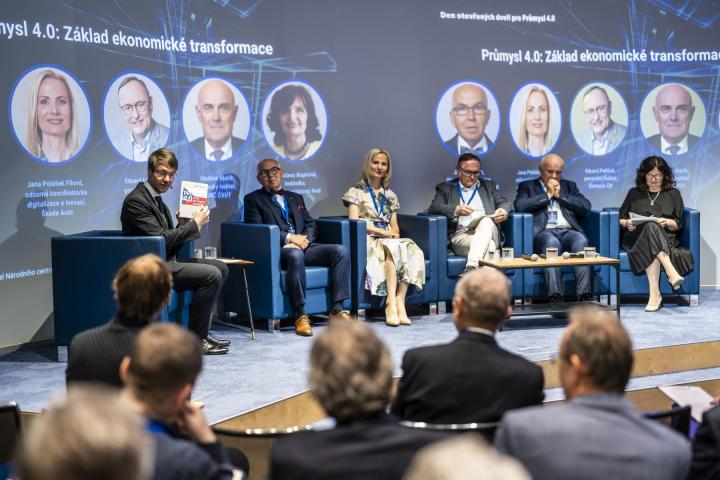
The basic thesis, on which the discussion panel unanimously agreed, was already stated in the introductory lecture by Professor Vladimír Mařík, Scientific Director of the CIIRC CTU and also the editor of the publication. The current economic situation in the Czech Republic is linked to the state of the economy in Germany, where stagnation is currently perceived. Energy prices are also crucial. The model of the Czech economy based on cheap labour has also been exhausted and we lack a vision for the future and a strategy. "The only truly technology-based and functional vision for economic transformation is Industry 4.0. Industry 4.0 is not only about technology, but especially about people, new business models, legislation or cyber security. There is no other alternative comprehensive concept at the moment," Mařík stressed.
Jiří Holoubek, a member of the Board of Directors of the Confederation of Industry of the Czech Republic, added: "Industry 4.0 is not a purely technological opportunity. Companies often do not realize that it is primarily an economic opportunity. Unfortunately, we cannot explain well, especially to small and medium-sized companies, that Industry 4.0 solutions bring quality results very quickly."
Jana Polášek Filová, Digitalisation and Innovation Coordinator, Škoda Auto, explained why we should be very interested in new business models: "New business models are a way to create value for customers. Thanks to Industry 4.0 technologies and digitalisation, every company today has access to be able to use the information and data it has effectively."
"We can imagine a really wide range of opportunities here, the important thing is to change the optics from savings towards opportunities and solutions for customers," adds Polášek Filová, an important aspect of the economic potential of new business models.
Miroslava Kopicová, Director of the National Education Fund, focused on the forecast of the labour market development, as she sees the decline in the working-age population as very significant. In sectors such as healthcare, education or IT, we will be short of tens of thousands of qualified employees by 2028. By 2045, we will have 400 000 fewer people of working age. "The problem is that we will be missing the cutting edge if we want to be a technologically advanced country and become leaders. And we won't produce them in a day. We need to open up our country to capable people."
"The problem with the shortage of people is big, but it is solvable, we need to work on it now," says Kopicová, emphasizing, "People are our greatest asset and we need to entice people for Industry 4.0."
Eduard Palíšek, CEO of Siemens ČR, presented a conceptual view on sustainability and resilience of the company in the discussion: "Geopolitical pressures, increasing attacks on intellectual property in digital form, disinformation, manipulation, unstable and volatile global markets - these are just some of the challenges that we must be able to respond to, anticipate and set up effective defence mechanisms against. This is why sustainability and resilience are important themes that permeate all areas of Industry 4.0 and digital transformation today. Companies that do not have a long-term vision and the need to develop in line with sustainability principles have no place in the competitive arena."
Sustainability is also linked to the important topic of energy management, which, according to Professor Mařík, must necessarily be included in the search for meaningful integrated solutions for the future. "According to a survey by the Confederation of Industry and Transport, however, only 10% of companies are considering including energy management in their digital strategies," said Jiří Holoubek.
Often we see the term Industry 4.0 next to Industry 5.0. "It has to be said that we have not currently completed the Industrial 4.0 revolution. Talking about 5.0 at a time when what 4.0 offers has not yet taken place does not bring anything new, just a new buzzword, let's avoid it," appeals Prof. Vladimír Mařík, who also draws on the joint statement of the Industry 4.0 Research Council and the Industry 4.0 Platform, i.e. the highest authorities.
"It is not only topics such as visions for the future, sustainability, the labour market, energy and new business models that will be addressed in the publication Industry 4.0 - the basis for the economic transformation of the Czech Republic, which will be published in autumn 2024. The discussion at the open day offered a sober vision based on truly functional principles, data and solutions. It should not escape those who care about our future and prosperity," concluded Robert Keil, Director of the National Centre for Industry 4.0.
A recording of the panel discussion is available here
Photogallery (foto J. Ryszawy, ČVUT)